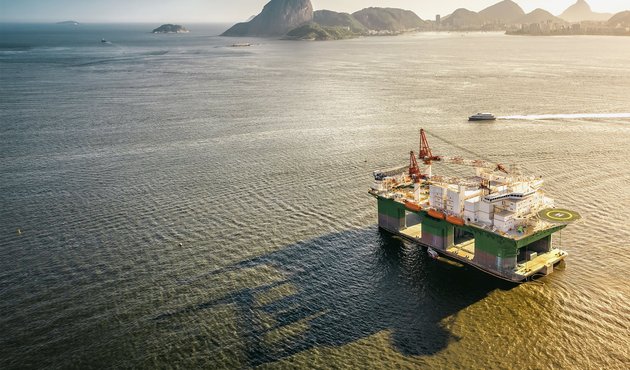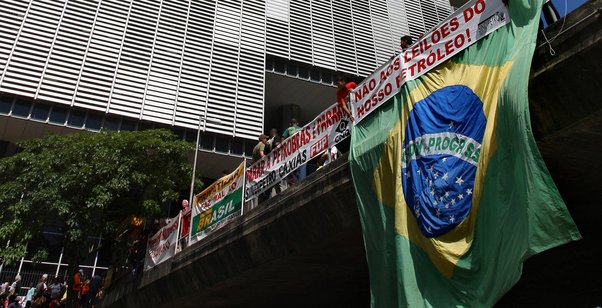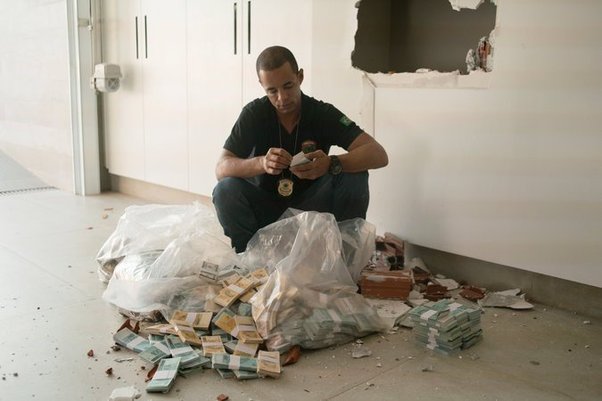High-ranking executives in two of the world’s largest companies were complicit in vast bribery schemes to secure sweetheart oil deals in Brazil, prosecutors have said in court documents reviewed by Global Witness
Trafigura and Vitol, the commodity trading goliaths, have found themselves embroiled in Brazil’s Car Wash scandal, one of the biggest corruption cases of all time.
Brazilian authorities are investigating them and rival Glencore for allegedly paying bribes totalling $15.3m to officials at the Brazilian state oil company Petrobras, in return for oil deals at preferential rates.
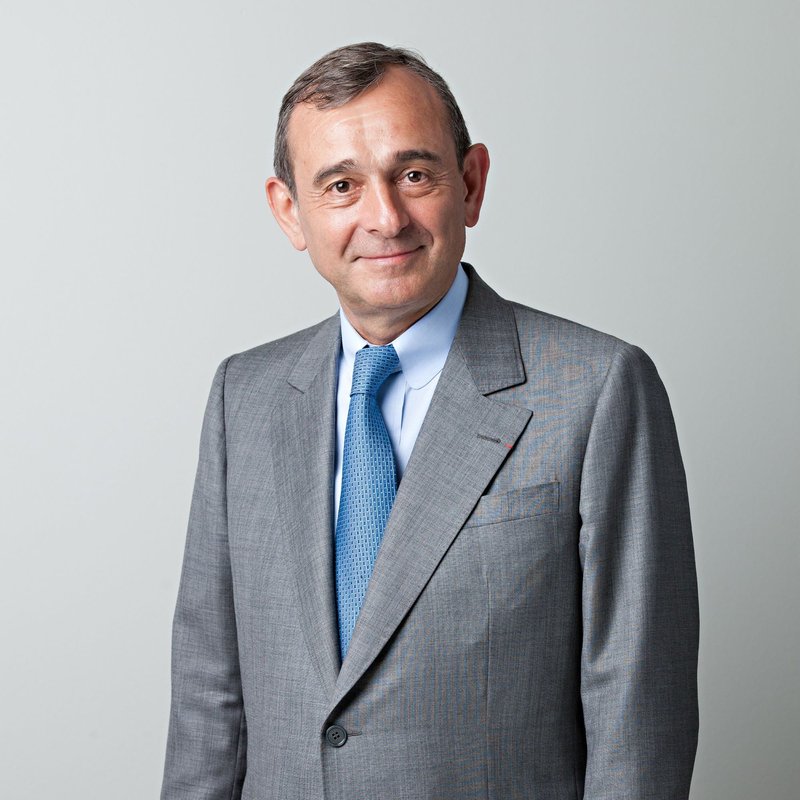
Last month, Global Witness was first to reveal the deep links between all three companies and middlemen already deeply implicated in the scandal, in a joint investigation with Swiss campaign group Public Eye.
Weeks later, Brazilian prosecutors announced “Operation Without Limits”, a major new phase of the Car Wash investigation specifically targeting the commodity traders.
Court documents examined by Global Witness now reveal the alleged complicity of some of Vitol and Trafigura’s leading lights in the bribery schemes.
The founder and former chairman of Trafigura, legendary trader Claude Dauphin, was among those informed of the criminality, alongside a former board director, say Brazilian authorities.
One current and two former Vitol executives were knowingly involved in the corruption too, according to Car Wash investigators.
The alleged involvement of such figures could make it hard for the firms to blame rogue employees for any corruption.
Past exposés by Global Witness and Public Eye have highlighted commodity traders’ use of corrupt intermediaries in major mining and oil deals.
As well as the executives accused by the Brazilian authorities, other senior company officials feature in the evidence.
Trafigura’s current Chief Operating Officer approved payments to a middleman now alleged to have used much of the money for bribes, emails show.
There is no evidence suggesting the COO knew of any bribery by the middleman.
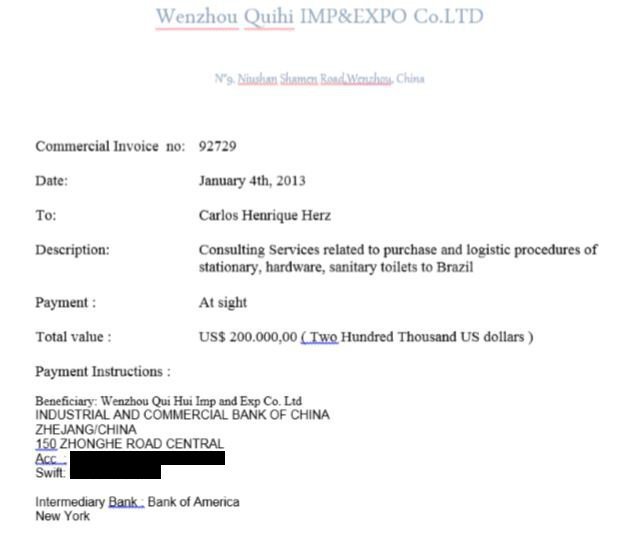
Brazilian authorities launched Operation Without Limits on December 5th, with 190 police deployed to raid the companies’ offices and enforce arrest warrants.
Seals were then lifted on dozens of court documents, which reveal for the first time the extent of senior management’s alleged involvement.
Brazilian investigators had used emails, contracts and financial documents to evidence the bribery schemes.
These show rival networks of middlemen, Petrobras officials and commodity traders competing to obtain corrupt contracts.
The prosecutors accuse two former, long-standing Trafigura executives of complicity in corruption and money-laundering.
The first is Mariano Marcondes Ferraz, a board member who oversaw its Brazilian and Angolan operations (convicted this year in a separate Brazilian bribery case).
The second is Marcio Magalhaes, a former Trafigura representative in Brazil, now in preventive custody.
A former Trafigura trader in the US, Tim Waters, also faces corruption allegations, although neither he nor any of the others accused in the current case have been charged.
Authorising the preventive arrests – ordered to prevent flight risk – Car Wash Judge Gabriela Hardt said in a November 31st preliminary ruling that emails suggested Ferraz, Magalhaes, Waters and Dauphin “in a conscious and voluntary way, used the criminal services of corruption and money-laundering provided by the criminal organisation … to benefit the business of the trading company with Petrobras.”
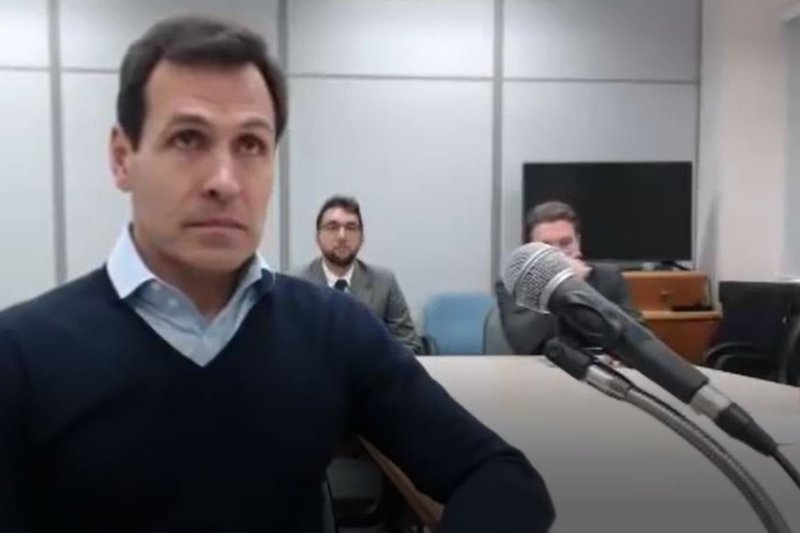
Mariano Ferraz, pictured here during interrogation in a separate case, is now alleged to be behind Trafigura's corruption schemes
One of the bribery schemes was allegedly masterminded by Magalhaes, Ferraz and a middleman named Carlos Herz, who was highlighted in Global Witness’s November report Friends in Low Places.
Herz was the conduit for bribes to Petrobras officials, according to prosecutors and police. Even prior to the new investigation, he was among ten people charged in August 2018 with other corruption offences, concerning asphalt deals with Petrobras.
Trafigura signed a contract on 18th December 2012 taking on Herz as an agent to use his “experience and networks” to “develop business opportunities” in the Brazilian oil sector.
Three weeks later, emails show arrangements being made for a meeting between Magalhaes, Herz, and his “amigo da PB” (friend in Petrobras).
Herz regularly invoiced Trafigura for “consultancy services” from mid-December 2012. But the document trail suggests this was far from bona fide: for it shows him passing on a portion of the money to a Petrobras official, identified by prosecutors as Marcus Antonio Alcoforado, then Commercial and Marketing Manager at Petrobras.
In one example, Herz invoiced Trafigura for half a million dollars in December 2012, to be paid into his Swiss UBS account.
He emailed Ferraz in late January 2013, saying he had paid out $200,000 to PB (the Petrobras “friend”) and needed to pay him a further $235,000. In follow-up emails to Ferraz that day and the next, Herz indicated that these payments were going to a person called Alc, identified by prosecutors as Alcoforado.
In one email, Herz wrote: “Alc wants to get paid soon.”
In another, he said he was “pressuring Alc to pass me the spreadsheet with information on the next shipments."
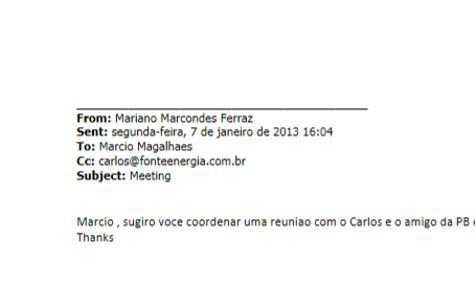
The court documents detail how, after receiving funds from Trafigura, Herz made various elaborately disguised onward payments.
He received invoices from purported Chinese companies, for the rough amounts he was due to pay his Petrobras contact: $200,000 for “consulting services related to purchase and logistic procedures of stationery, hardware, sanitary toilets” on 4th January, and $235,200 for more purported sanitary services on 24th January.
Brazilian Federal Police say these invoices were concocted by a money-launderer, who used pseudonyms including Fernanda and Raimundo Florencio in his communications with Herz.
“Herz was using the services of the money-launderer Wander … to manage the money in cash, and thus effect payment of bribes,” according to the Federal Police’s analysis. Herz paid out $1.3m of Trafigura funds in total to Alcoforado in this way, police say.
Senior Trafigura officials were included in the approval process for the payments to Herz. The company’s Chief Operating Officer Mike Wainwright approved a $212,000 payment to Herz on 13 September 2013 – a sum, Herz subsequently wrote, that would be used to pay “our friend.”
The “friend” was again Alcoforado, say police. A 16th September invoice to Herz for $254,400 – again for consultancy over the purchase of “sanitary toilets” and so on – was allegedly cover for paying Alcoforado.
Another payment to Herz that prosecutors say was used for bribery – this one made in March 2013, for $384,000 – was approved by Wainwright and Trafigura’s Andrew Summers, then the co-head of its global fuel oil trading desk in Geneva.
There is no evidence that Wainwright or Summers knew of the onward payments Herz was making.
Payments continued until 2014, a year in which Trafigura paid Herz a whopping $1m in a single transfer, purportedly as a “bonus related to my services on fuel business – Brazil, shipping and market intelligence.”
Trafigura said there was nothing improper about its officials approving payments to Herz, and should not be “construed as approval of any subsequent payments made by the recipient.”
Any suggestion “that Trafigura’s current management knew that payments to an intermediary would be used to make improper payments to employees of Petrobras is not correct," a spokesman added.
Global Witness sent questions to Wainwright, Waters and Summers through Trafigura, and to Summers through his Linkedin account, but received no replies.
Magalhaes did not reply to questions sent via his lawyers.
In total, prosecutors say Trafigura paid at least $6.1m in bribes to Petrobras civil servants from 2009 to 2014, $4.6m of which was handled by Herz alone.
They allege Alcoforado was only one of a number of Petrobras employees to have received pay-outs, saying other beneficiaries included one of Petrobras’s most senior executives, Supply Director Paulo Roberto Costa (now serving a 12-year corruption sentence).

Car Wash investigators believe late Trafigura founder and head honcho Claude Dauphin was also involved in the scandal, saying he was informed of the bribery amid a turf war over Trafigura’s bribery schemes.
This allegedly involved rival Petrobras officials, various middlemen and Magalhaes, who put noses out of joint by failing to pay out bribe moneys due.
In 2011, according to police, two middlemen – Bo Ljungberg and Luiz Andrade – conspired to wrest control of Trafigura’s corrupt oil business from Magalhaes.
As part of this plan, emails show Ljungberg met with Dauphin and Ferraz in Geneva in October 2011, to tell him that Magalhaes’s schemes were not working for Trafigura, and how they (Ljungberg and Andrade) could secure more business, at better rates, for the company.
Andrade emailed Ljungberg on 13 October 2011, with notes ahead of his meeting with Claude Dauphin.
The Trafigura founder, Andrade said, should be told about the low rates “the team” (Petrobras officials) could secure for Trafigura, and how “the team” was uncomfortable with Magalhaes’s request for official documentation on their trades.
The notes also said Ljungberg should tell Dauphin that Magalhaes had been facilitating corrupt deals between Trafigura and Petrobras’s competitors, an allegation echoed by prosecutors and police.
Dauphin died in 2015.
Ljungberg and Andrade were charged in the August 2018 asphalt bribery case, alongside Herz.
All three were also the subject of the arrest warrants issued on 5 December.
Herz is under preventive detention, while Brazil has put out an Interpol “red notice” for Ljungberg and Andrade, who live in Sweden and the US respectively.
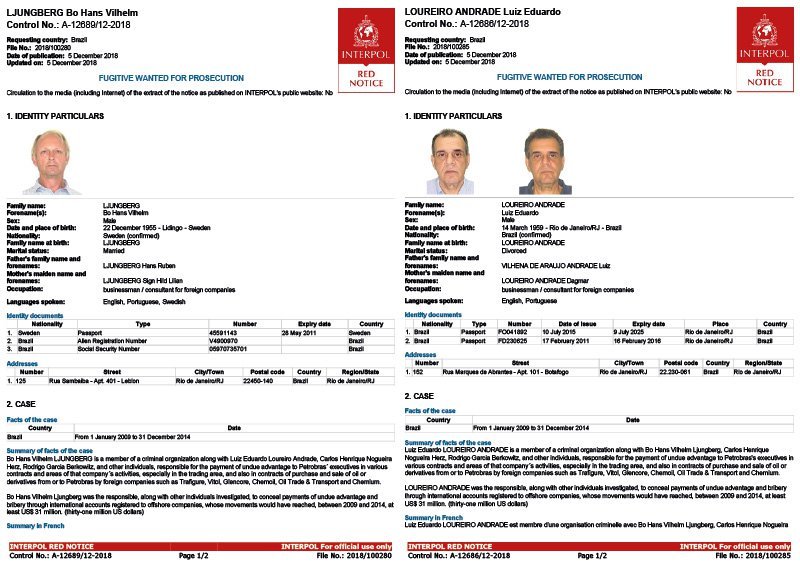
Trafigura said its “office was visited on the 5th December 2018 by members of the Brazilian authorities. No company property was taken and no current Trafigura employees have been detained.”
“We are taking these allegations seriously and are carefully reviewing any information available,” a spokesman added.
Police and prosecutors’ allegations against Vitol are similarly detailed, setting out a total of $5.1m in alleged bribes.
Prosecutors say one former and one current Vitol executive knowingly participated in one of the corruption schemes linked to the company: Miguel Angel Loya, the head of Vitol’s US operations, and Tony Maaraoui, its Latin America and Caribbean director.
Another bribery scheme was run by the man who headed Vitol’s Brazil operations from 2005 to 2016, Marcio Dutra Goncalves, prosecutors say.
In a 30th November court decision to authorise arrest warrants, Judge Hardt said Loya and Maarraoui, together with a third Vitol employee, seem to have “consciously and voluntarily” used “the criminal services of corruption and money laundering” to obtain business with Petrobras.
Loya also came to Global Witness’s attention in its November report, which revealed how in May 2010, he met in Houston, Texas, with Ljungberg.
The Swede’s aim was to secure Brazilian oil business with Vitol as part of a separate bribery scheme. Loya previously told Global Witness he “does not recall the details of the conversation.”
Vitol then admitted using Ljungberg as an agent for Brazilian oil deals, but said Loya was not involved, as it was not his role.
But Judge Hardt said Ljungberg may have been the main contact of Loya and Maaraoui in the alleged bribery scheme, which ran from 2011 to 2014.
Maaraoui “contracted Bo Hans Wilhelm Ljungberg to intermediate operations with Petrobras, had knowledge of and assented to the payment of bribes,” a prosecution summary states.
The court evidence shows that Ljungberg discussed Petrobras business with both Loya and Maaraoui.
It also shows that Vitol contracted Ljungberg and paid his companies millions of dollars, and that Ljungberg and Andrade paid Petrobras officials from the Vitol funds, through offshore companies.
In one example of their conduct, Ljungberg emailed Andrade about his discussions with Loya and Maaraoui over the potential purchase of “vacuum gas oil” on the ship Amazon Gladiator.
The deal was struck in early May 2011, with Vitol paying Petrobras an eventual $40.6m for the cargo.
But the correspondence shows Andrade’s contacts at Petrobras had agreed to sell the cargo to Vitol at a below-market price. In an email of 28th April 2011, “Tiger” – a codename for Andrade, according to prosecutors – told Ljungberg his contacts were willing to sell the oil to Vitol at “WTI + 17.50” ($17.50 a barrel above the benchmark Western Texas Intermediate price).
“According to them market is at 25/chances 26 [above the WTI price] meaning there is margin for Vit,” Andrade wrote.
Eventually, Vitol and Petrobras agreed a price at $16 above WTI, the final invoice shows. Prosecutors allege this bargain price was only achieved through bribery.
On 6th June, Ljungberg sent Vitol his invoice for $355,431.75. He dealt with a man who was then none other than Managing Director of Vitol: David Fransen, Fransen is still chairman of its Swiss unit.
There is no evidence that Fransen knew of Ljungberg’s alleged bribery.
Contacted by Global Witness, Vitol said Mr Fransen was unable to comment.
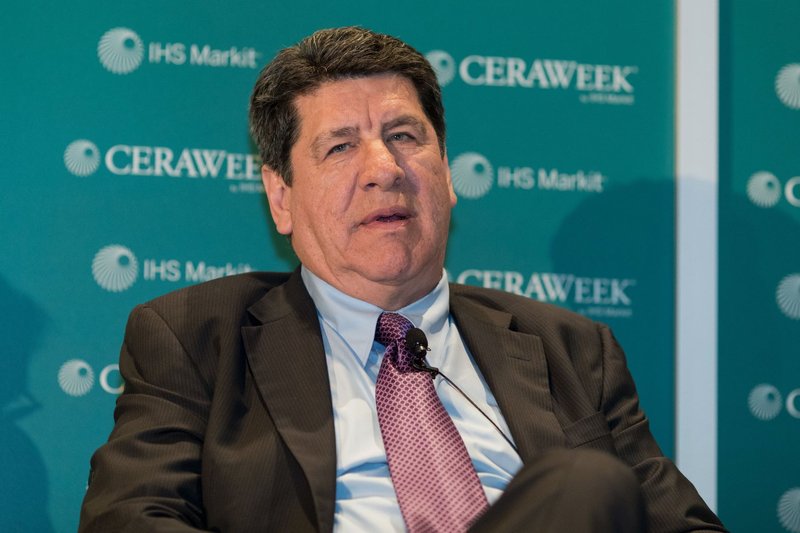
Mike Loya previously told Global Witness he and Ljungberg were merely "old colleagues". A Car Wash judge now says the truth is more sinister
After Ljungberg received the money through his British Virgin Islands company Encom Trading, the documents show a large share of it being sent on to Petrobras officials going under various codenames.
A spreadsheet shows $74,760 going to “Phil”, $96,120 to “Deh”, and another $96,120 to “Morce” – two oil marketing staff based in Houston and one in Brazil, prosecutors say.
The court documents detail a long-running competition for corrupt business with Petrobras between the Ljungberg-Andrade network and Marcio Dutra Goncalves, former head of Vitol's Brazil operations.
Prosecutors allege that since at least 2010, Vitol had used him to “corrupt Petrobras civil servants linked to the trading of ‘clean products’ like diesel, gasoline and kerosene."
In April 2011, when Ljungberg and Andrade were setting up their alleged bribery scheme, Andrade wrote that he had lunch with some Petrobras employees and that “as far as they can see vit [Vitol] used to have a very powerful system in place” on so-called "clean" products.
But this had run into trouble due to both staff movements and a payment dispute between Dutra and two of his key Petrobras contacts.
“Since last Nov (when both guys left) vit doesn’t sell anything which makes him believe the door is open,” said Andrade.
“They suggest we really discuss the ‘agreement’ personally with Vit to avoid any misunderstanding to which I agree is the proper way of doing it.”
Vitol said it would be inappropriate to comment on specific allegations made by the Brazilian prosecutors at this time.
A spokeswoman added that the company had a zero tolerance policy over bribery and corruption and cooperates fully with the authorities wherever it operates.
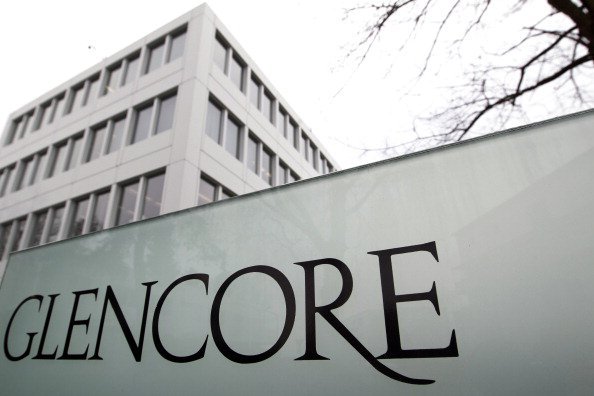
Glencore also features in the new evidence, far from the first time it has come to Global Witness's attention. A spokesman insisted it "takes ethics and compliance seriously"
The new documents reveal the remaining player in the global commodity trade’s big three faces grave allegations too.
Brazilian prosecutors also allege Glencore paid $4.1m in bribes to Petrobras officials.
Some of these payments relate to deals involving the same middlemen and corrupt officials mixed up in the Trafigura and Vitol schemes, the prosecutors said.
In May 2011, Andrade – this time acting as an agent for Glencore – sent three of his Petrobras contacts a table summarising pay-outs from two Glencore oil deals.
It showed he had received $144,670 from the two deals, the three Petrobras officials receiving nearly $110,000 of this. Once again, the individuals were all referred to by codenames, later deciphered by prosecutors.
A further $14,467 was listed as going to “Extras” – probably additional Petrobras employees, say prosecutors.
Glencore said it “takes ethics and compliance seriously” and will cooperate with Brazilian authorities.
Petrobras said employees accused of involvement in the alleged wrongdoing with the various commodity companies were immediately dismissed.
An internal team has been assigned to investigate the case and identify the root causes of the problems, the company announced.
The statement said: “Petrobras reaffirms and reinforces its zero tolerance regarding fraud and corruption.”
In previous statements to police, both Ljungberg and Herz have denied any criminality.
Ljungberg is now technically a "fugitive", according to Interpol. Andrade, also now a "fugitive", previously claimed Global Witness was wrong in its "assumptions" and said he had been instructed not to speak to our investigative team.
Global Witness is repeating its call on the UK, the US and Switzerland to launch investigations. The alleged offences have ties to all three jurisdictions, with particularly strong US links, as the Petrobras officials involved were based in Houston.
Taken as a whole, these are some of the most grievous and detailed bribery allegations ever made against the big three commodity traders in an industry already stained by corruption and scandal.
Yet Brazilian prosecutors leading Operation Without Limits warn the investigations are merely at the initial stage and “only reveal the tip of the iceberg”.
“Much will still be deepened and revealed,” prosecutors have said. Indeed, although the operation has thus far focused on the period 2009 to 2014, investigators say evidence suggests the corruption over petroleum trading may have continued up until the present day.
